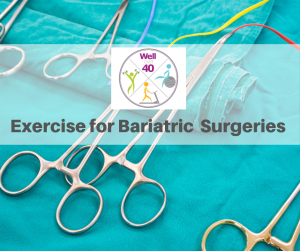 Recent medical research* has highlighted that one of the most significant adverse outcomes from gastric bypass surgery is the loss of bone density and an increase of bone turnover. In simple terms, the surgery results in an increased risk of osteoporotic changes. The good news is that researchers have found that exercise is a simple, non-invasive, drug free tool to help mitigate bone loss in patients that have had bariatric surgery.
Recent medical research* has highlighted that one of the most significant adverse outcomes from gastric bypass surgery is the loss of bone density and an increase of bone turnover. In simple terms, the surgery results in an increased risk of osteoporotic changes. The good news is that researchers have found that exercise is a simple, non-invasive, drug free tool to help mitigate bone loss in patients that have had bariatric surgery.
In a recent clinical trial, women who had undergone bariatric surgery were either prescribed a six month exercise program, working out 3 days a week, or no program at all. Those that completed the exercise program showed ‘significantly smaller losses at the femoral neck, total hip and distal radius’ than those who were not prescribed any exercise.
In summary, the researchers argue that patients should be informed about the benefits of exercise following bariatric surgery to enhance and maintain the benefits of the operation and most importantly, to mitigate the bone loss that follows bariatric surgery.
Are you contemplating bariatric surgery?
If you are contemplating a gastric bypass procedure, you should be also thinking about starting to exercise. If you are looking at surgery you have most likely tried diet and exercise and found it hasn’t worked for you. But the exercise we are talking about isn’t about weight loss as much as it is about fitness – that is, preparing your body for the rigours of the surgery. Starting exercise before the surgery will also help you form a new routine that will be easier to maintain once your operation is complete.
We understand that surgery is not a small step. It is a lifelong commitment to changing your lifestyle and you may need support and care to regain your love of movement so that you can enjoy your new quality of life. Not only will exercise protect your bones, but it has proven benefits for reducing your risk of chronic illness, improving sleep and a positive impact on mental health. How good does that sound?
Where do I start?
It is important to see a qualified allied health professional such as an accredited exercise physiologist for exercise prescription both before and after surgery to ensure that you get the most clinical up-to-date, appropriate, and relevant information for your recovery. Your doctor may be able to refer you under Medicare, subject to you meeting the eligibility requirements. You may qualify for a free behaviour change program, such as My Health for Life, which is run at our clinic. This would be a good basis to get you thinking about some of the changes you need to make. Alternatively, you can see one of our caring and supportive exercise physiologists to get starting in regaining your quality of life.
To make an appointment book online, or call us at the clinic on 38053223 to chat about your options.
*Igor H Murai, Hamilton Roschel, Wagner S Dantas, Saulo Gil, Carlos Merege-Filho, Roberto de Cleva, Ana L de Sá-Pinto, Fernanda Lima, Marco A Santo, Fabiana B Benatti, John P Kirwan, Rosa M Pereira, Bruno Gualano, Exercise mitigates bone loss in women with severe obesity after Roux-en-Y gastric bypass: a randomized controlled trial, The Journal of Clinical Endocrinology & Metabolism, https://doi.org/10.1210/jc.2019-00074

